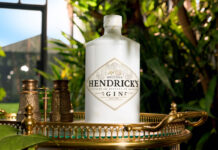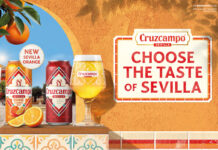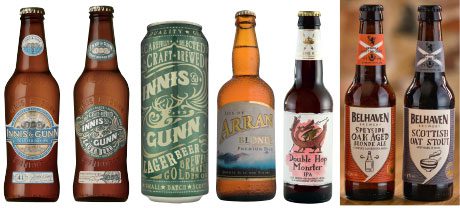
is an unoaked Helles-style lager available in 330ml bottles and 500ml cans. Arran Blonde is an award-winning ale from the Arran Brewery. The brewery is currently investing and has plans to grow in international markets. Specialist beers from Greene King include Greene King Double Hop Monster IPA and the range of Belhaven specialist beers including Speyside Oak-aged Blonde Ale and Scottish Oat Stout.
CRAFT beers are hot (sales wise) and, increasingly, craft beers are cool (image wise). It should be a great combination for the coming summer.
Craft beers are also in many ways different. Specialist beers from home and abroad can command high prices, typically averaging out at around £2.40 a unit. And, in general, they’re not in multipacks. So, while that can lead to a bit of work in shelf placing and facing up it also makes them look the part, a bit special.
Edinburgh-based specialist beer provider Innis & Gunn, referring to IRI research, notes that in the 12 months to early February this year craft beer sales were up around 11% on the previous year, a very positive performance considering the overall beer market hasn’t been strong in recent years.
It’s in the convenience channel that much of the growth has taken place.
However, that doesn’t mean there’s been growth in all convenience stores. Almost all of the growth and around 80% of the convenience sales are in multiple convenience outlets. Symbol stores are reckoned to have seen value sales rise modestly and volume sales fall slightly.
But it does certainly look like an opportunity, especially if we have a summer when international sport might encourage locals and visitors alike to try something crafty.
Among the craft beer companies views are certainly upbeat.
• Crawford Sinclair, director of sales in the UK for Innis & Gunn said he saw good signs for both world beers and craft beers but he’s not sure that retailers are making the most of them,
“I’d say the market is very buoyant, both segments are healthy and enjoying good value and volume growth. The world and craft fixtures aren’t expanding in line with rate of sale, however, so there’s increased competition for space.
“There is definite seasonality in craft beer and this should be taken into consideration throughout the year as a range of seasonal beers will be available from key suppliers.
“Provenance and regionality is key, it’s a big selling point, but, whereas in England, local means ‘on your doorstep’, it has a broader definition in Scotland,” he said.
• Neil Jardine, take-home sales director at Belhaven brand owner Greene King Brewing & Brands, said: “It’s fair to say beer, and ale in particular, is having a renaissance at the moment.
“Craft beers are growing even faster in the Scottish off-trade than they are UK-wide, up 18% in volume and up 23% in value versus last year.
“A concise range of craft beers can offer an excellent trade-up opportunity in good quality c-stores, particularly where categories like deli foods sell well. The range should cover the most important and popular beer styles – pale ales and IPAs, craft lagers and pilsners, and stouts and porters are the styles generating most interest and growing sales strongly – with minimal duplication to allow a wide range without too many SKUs.”
• Arran Brewery is confident enough to invest in the future, both on Arran and elsewhere and in its craft beer activities as well as other projects.
It recently announced it was to invest up to £80,000 in the brewery on Arran. The investment on Arran will see production capacity increase three-fold and the firm also reckons it will mean costs can be substantially reduced. The firm plans to recruit and train several new brewers.
Arran Brewery’s Arran Blonde saw sales grow by 11% in 2013.
And the firm has pointed to Nielsen figures prepared for Scottish Grocer’s special Scottish off-trade league tables published in the spring, which showed Arran Blonde had outstripped the 6% growth achieved by packaged ale in general.
Arran Brewery’s managing director Gerald Michaluk said: “I am happy with our growth which we capped last year for fear of producing more than 500,000 litres and incurring a higher duty rate.”
He said the brewery had achieved a great deal since he purchased it in 2008.
“ We have done fantastically well with Arran Blonde winning the World Beer Awards title of Europe’s Best All Grain Wheat Beer in 2010 and Arran Dark winning not just the European title but the world title of the World’s Best Dark Brown Ale in 2012. Quality is paramount and by using only all grain, whole hops and only natural ingredients we make fantastic beer and this will be the secret of our success: the quality of our beer,” he said.
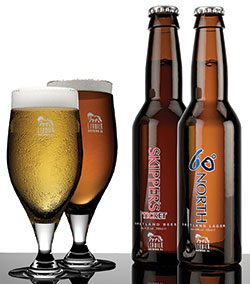
• This will be the first summer under its new identity for Stirling-based Black Wolf Brewery.
The former Traditional Scottish Ales relaunched under its new name complete with a new range of craft beers in bottle, keg and cask, as well as a new look for its existing packaging and websites.
The new products include Tundra, an elderflower-flavoured wheat beer; Florida Black, a stout and Big Red, a red beer. The ales are joined by premium lager, Coulls, in bottle and keg.
The brewery’s existing brands – Lomond Gold, Glencoe, Ben Nevis, William Wallace, 1488 and Double Espresso – are being rebranded as Black Wolf over coming months.
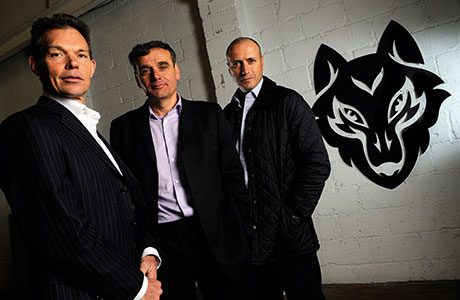
The Mercer brothers – John, Graham and Jimmy – launched the Lerwick brewery on Shetland in 2011.
• Ossian and Blackfriar, two beers crafted by Inveralmond Brewery in Perth moved on to the shelves of 45 of Marks & Spencer’s biggest food stores this May.
Bob Hogg, commercial director of The Inveralmond Brewery, said: “We’ve always been confident in the quality of our range. To see Inveralmond stocked in one of the country’s most established retailers, with 130 years of experience in the marketplace, is fitting for two brands of beautiful beer that are as unique as they are excellent.”
• At Isle of Skye Brewery managing director Kenny Webster said: “The real ale drinker has a higher average spend, £1.79 per 500ml bottle compared to £1.29 for the average beer drinker.
“74% of real ale drinkers think it is worth paying extra for quality, along with 74% looking for provenance when purchasing. Given these facts, those stocking a range of craft beers should look to provide as much information on provenance to the consumer as possible, so that they can make a more informed purchase decision.
“The market for craft beers in Scottish take-home channels is strong at present, we are in talks with a number of supermarkets and grocery chains and hope to have secured five new listings in the next six months.”
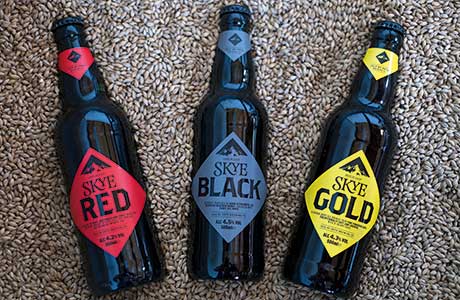
• Craft brewing from the edge of the north Atlantic is on offer at Shetland-based Lerwick brewery.
The brewery, established in 2011 by the Mercer brothers, John, Graham and Jimmy has, they say, many natural advantages – including a wonderful climate for high-quality brewing and excellent water.
It’s a long way away from the main markets but the brewing operation ties in with the brothers’ other interests in gas and gas services and construction, which mean they have a transport and storage infrastructure on Shetland and the mainland.
The two Lerwick beers are 60º North (the brewery’s latitude, it’s closer to Bergen in Norway than to Edinburgh) a 4.8% craft pilsner lager, and Skippers Ticket a 4.0% chestnut-red ale.
Packaging is designed to be stylish, verging on the minimalist, with cases that can readily be used for floor stacks.




